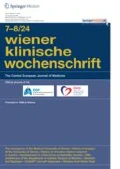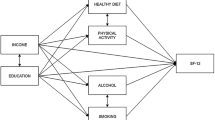Summary
Background
The aim of this study was to analyse the impact of different socio-economic variables on the lifestyle factors, like lack of physical activity, diet rich in meat, and smoking, across sex and age groups in the general Austrian population to formulate more targeted public health measures.
Methods
The Austrian Health Interview Survey 2006–07 contains data of 15,474 people, representative for the general population. Statistical analyses included linear and logistic regression models.
Results
Lack of physical activity was more prevalent in women, while unhealthy nutrition and daily smoking were more prevalent in men. Overall, profession was the strongest predictor for health behaviour in men, while the educational level played the most significant role in women. Subjects in higher age groups had a more healthy nutrition and were less likely to smoke, but had a higher chance for lack of physical activity.
Discussion
Socio-economic factors predict lifestyle choices differently in different age groups. For example, in men, the highest percentage of daily smokers was found in the middle age, while the youngest age group was the one that smoked the most in women. Furthermore, the educational level had a reverse effect on women in the oldest age group, where those with tertiary education smoked three times more than those with less education. Our results emphasise the importance of taking a holistic approach towards health, including educational, cultural and age-specific policies to improve the overall health status and health equality of a population.
Zusammenfassung
Hintergrund
Ziel dieser Studie war es, den Einfluss verschiedener sozio-ökonomischer Determinanten auf die Lebensstilfaktoren ‚fehlende körperliche Bewegung‘, ‚fleisch-reiche Ernährung‘, und ‚Rauchen‘ nach Geschlecht und in verschiedenen Altersgruppen zu analysieren, um gezieltere Public Health Maßnahmen zu formulieren.
Methoden
Der Austrian Health Interview Survey 2006–07 beinhaltet Daten von 15.474 Personen, und ist für die österreichische Bevölkerung repräsentativ. Statistische Auswertungen beinhalteten lineare und logistische Regressionsanalysen.
Ergebnisse
Frauen wiesen öfter mangelnde körperliche Bewegung auf, während bei Männern eine ungesunde Ernährung und Rauchen häufiger vorkamen. Der Beruf war der stärkte Prädiktor bei Männern, während bei Frauen die Bildung den größten Einfluss hatte. Personen in den höheren Altersgruppen hatten eine gesündere Ernährung und rauchten weniger, hatten aber auch eine größere Wahrscheinlichkeit für fehlende körperliche Bewegung.
Diskussion
Sozio-ökonomische Determinanten haben unterschiedliche Auswirkungen auf Lebensstilfragen in unterschiedlichen Altersgruppen. Zum Beispiel fanden sich die meisten täglichen Raucher bei Männern in der mittleren Altersgruppe, während es bei den Frauen die jüngste Altersgruppe war, die am meisten rauchte. Außerdem hat Bildung einen umgekehrten Effekt bei Frauen, wo solche mit tertiärer Bildung dreimal mehr rauchten als jene mit weniger Bildung. Unsere Ergebnisse betonen, wie wichtig es ist, einen ganzheitlichen Zugang zu Gesundheit zu haben, welcher bildungspolitische, kulturelle und altersspezifische Maßnahmen umfasst, um einen einheitlichen und gerechten Gesundheitszustand in der Bevölkerung zu erreichen.
Similar content being viewed by others
References
Marmot M. The status syndrome. How social standing affects our health and longevity. London: Bloomsbury Plc; 2004.
Kim HJ, Ruger JP. Socioeconomic disparities in behavioural risk factors and health outcomes by gender in the Republic of Korea. BMC Public Health. 2010;10:195.
Kaplan GA, Keil JE. Socioeconomic factors and cardiovascular disease: a review of the literature. Circulation. 1993;88:1973–98.
Rogers RG, Everett BG, Onge JM, Krueger PM. Social, behavioural, and biological factors, and sex differences in mortality. Demography. 2010;47:555–78.
Wilkinson RG, Pickett KE. Income inequality and population health: a review and explanation of the evidence. Soc Sci Med. 2006;62:1768–84.
Stronegger WJ, Freidl W, Rásky E. Health behaviour and risk behaviour: socio-economic differences in an Austrian rural county. Soc Sci Med. 1997;44:423–6.
Kjøllesdal MR, Holmboe-Ottesen G, Mosdøl A, Wandel M. The relative importance of socio-economic indicators in explaining differences in BMI and waist: hip ratio, and the mediating effect of work control, dietary patterns and physical activity. Br J Nutr. 2010;104:1230–40.
Buckland G, Salas-Salvadó J, Roure E, Bulló M, Serra-Majem L. Socio-demographic risk factors associated with metabolic syndrome in a Mediterranean population. Public Health Nutr. 2008;11:1372–8.
Paek KW, Chun KH, Jin KN, Lee KS. Do health behaviours moderate the effect of socioeconomic status on metabolic syndrome? Ann Epidemiol. 2006;16:756–62.
Shahar D, Shai I, Vardi H, Shahar A, Fraser D. Diet and eating habits in high and low socioeconomic groups. Nutrition. 2005;21:559–66.
Ball K, Mishra GD, Crawford D. Social factors and obesity: an investigation of the role of health behaviours. Int J Obes Relat Metab Disord. 2003;27:394–403.
Khaw KT, Wareham N, Bingham S, Welch A, Luben R, Day N. Combined impact of health behaviours and mortality in men and women: the EPIC-Norfolk prospective population study. PLoS Med. 2008;5:e 12.
Kim S, Symons M, Popkin BM. Contrasting socioeconomic profiles related to healthier lifestyles in China and the United States. Am J Epidemiol. 2004;159:184–91.
Lohff B, Rieder A. Gender medicine. Wien Med Wochenschr. 2004;154:391–3.
Dorner T, Kiefer I, Kunze M, Rieder A. Gender aspects of socioeconomic and psychosocial risk factors of cardiovascular diseases. Wien Med Wochenschr. 2004;154:426–32.
Deeks A, Lombard C, Michelmore J, Teede H. The effects of gender and age on health related behaviours. BMC Public Health. 2009;9:213.
Petersson U, Ostgren CJ, Brudin L, Ovhed I, Nilsson PM. Predictors of successful, self-reported lifestyle changes in a defined middle-aged population: the Soderakra Cardiovascular Risk Factor Study, Sweden. Scand J Public Health. 2008;36:389–96.
Statistik Austria, editor. Im Auftrag von Bundesministerium für Gesundheit, Familie und Jugend. Österreichische Gesundheitsbefragung 2006/07. Hauptergebnisse und methodische Dokumentation. Vienna: Statistics Austria; 2007.
Aromaa A, Koponen P, Tafforeau J, Vermeire C, HIS/HES Core Group. Evaluation of health interview surveys and health examination surveys in the European Union. Eur J Public Health. 2003;13(3 Suppl):67-72.
Freidl W, Fazekas C, Raml R, Pretis M, Feistritzer G. Perceived social justice, long-term unemployment and health. A survey among marginalised groups in Austria. Soc Psychiatry Psychiatr Epidemiol. 2007;42:547–53.
Freidl W. The impact of anomia as a factor in a demand resource model of health. Soc Sci Med. 1997;44:1357–65.
Stein KV, Rieder A, Dorner TE. East-West gradient in cardio-vascular mortality in Austria: how much can we explain by following the pattern of risk factors? Int J Health Geogr. 2011;10:59.
Koivusilta L, Rimpelä A, Vikat A. Health behaviours and health in adolescence as predictors of educational level in adulthood: a follow-up study from Finland. Soc Sci Med. 2003;57:577–93.
Molloy GJ, Stamatakis E, Randall G, Hamer M. Marital status, gender and cardiovascular mortality: behavioural, psychological distress and metabolic explanations. Soc Sci Med. 2009;69:223–8.
Reijneveld SA. Reported health, lifestyles, and use of health care of first generation immigrants in the Netherlands: do socioeconomic factors explain their adverse position? J Epidemiol Community Health. 1998;52:298–304.
Lindström M, Sundquist J. Immigration and leisure-time physical inactivity: a population-based study. Ethn Health. 2001;6:77–85.
Marques-Vidal P, Vollenweider P, Waeber G, Paccaud F. Prevalence of overweight and obesity among migrants in Switzerland: association with country of origin. Public Health Nutr. 2007;14:1148–56.
Nicolaou M, Doak CM, van Dam RM, Brug J, Stronks K, Seidell JC. Cultural and social influences on food consumption in Dutch residents of Turkish and Moroccan origin: a qualitative study. J Nutr Educ Behav. 2009;41:232–41.
van Oort FV, van der Ende J, Crijnen AA, Verhulst FC, Mackenbach JP, Joung IM. Determinants of daily smoking in Turkish young adults in the Netherlands. BMC Public Health. 2006;6:294.
Dorner T, Fodor JG, Lawrence K, Ludvik B, Rieder A. HDL-knowledge in the lay public: results of a representative population survey. Atherosclerosis. 2007;195:195–8.
Mosca L, Mochari H, Christian A, et al. National study of women’s awareness, preventive action, and barriers to cardiovascular health. Circulation. 2006;113:525–34.
Dallongeville J, Marécaux N, Cottel D, Bingham A, Amouyel P. Association between nutrition knowledge and nutritional intake in middle-aged men from Northern France. Public Health Nutr. 2001;4:27–33.
Shepherd J. International comparison of awareness and attitudes towards coronary risk factor reduction: the HELP study. Heart European leaders panel. Atherosclerosis. 1997;137(Suppl):117-23.
Harper S, Lynch J, Smith GD. Social determinants and the decline of Cardiovascular diseases: Understanding the links. Annu Rev Public Health. 2011;32:39–69.
Dorner T, Fodor JG, Allichhammer D, et al. “A heart for Vienna”—the prevention program for the big city. Blue-collar workers as a special target group. Wien Med Wochenschr. 2006;156:552–7.
Wennerholm C, Grip B, Johansson A, Nilsson H, Honkasalo ML, Faresjö T. Cardiovascular disease occurrence in two close but different social environments. Int J Health Geogr. 2011;10:5.
Freyer-Adam J, Gaertner B, Tobschall S, John U. Health risk factors and self-rated health among job-seekers. BMC Public Health. 2011;11:659.
Conflict of interest
The authors declare that there is no conflict of interest.
Author information
Authors and Affiliations
Corresponding author
Rights and permissions
About this article
Cite this article
Dorner, T., Stronegger, W., Hoffmann, K. et al. Socio-economic determinants of health behaviours across age groups: results of a cross-sectional survey. Wien Klin Wochenschr 125, 261–269 (2013). https://doi.org/10.1007/s00508-013-0360-0
Received:
Accepted:
Published:
Issue Date:
DOI: https://doi.org/10.1007/s00508-013-0360-0
Keywords
- Age-related health behaviour
- Socio-economic health indicators
- Socio-demographic health indicators
- Lifestyle choices
- Risk factors




